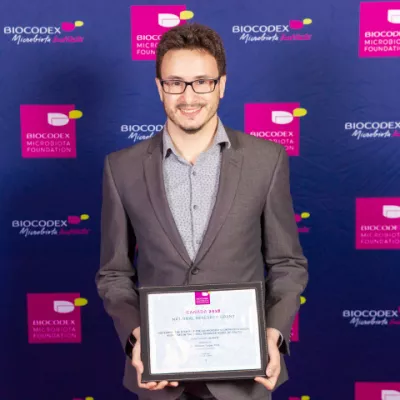
Project description
News from Dr. Maryam Kebbe
Introduce yourself, your research project and your experience with the Microbiota Grant
My name is Dr. Maryam Kebbe. I direct the Prenatal & Postnatal Exposures on Adiposity Development in InfantS (PEADS) Laboratory at the University of New Brunswick, Fredericton, Canada. My research aims to examine nutrition, physical activity, and physiological factors, specifically breastmilk and the gut microbiome, that can affect obesity programming. The research project funded by the Biocodex Microbiota Foundation aims to examine how the infant gut microbiome and gut inflammatory markers evolve across lactation stages in early infancy, and whether differences exist based on obesity class and metabolic health.
What inspired you to pursue this specific research project?
Research on the infant gut microbiome has primarily been focused on late infancy, with limited knowledge on colonization of the infant gut in early infancy. Preliminary research I have conducted identified a role for inflammatory markers in breastmilk on the infant gut microbiome. Collectively, these findings inspired me to further understand the role of different lactation stages on inflammation, the infant gut microbiome, and obesity development in early life.
How has the Biocodex Microbiota Foundation Grant support contributed to the success and advancement of your research?
The Biocodex Microbiota Foundation provided me with funds to conduct the first clinical project within the PEADS Laboratory. These funds allowed me to spearhead my research and advance my vision of reducing the intergenerational transmission of obesity. With funds from the Biocodex Microbiota Foundation, I have established a foundation and momentum for my research, attracting highly qualified personnel and support for acquiring state-of-the-art equipment and resources.
In what ways do you envision your work influencing the microbiota-related research in the future?
I envision my work making significant contributions to the field of microbiota-related research. First, understanding how the gut microbiome evolves across lactation stages in early infancy can provide valuable insights into factors influencing microbial composition and their potential long-term effects on obesity and metabolic health. This research can contribute to the development of targeted interventions and strategies to modulate the microbiome for improved health outcomes. I hope that my work inspires and encourages other researchers to explore similar avenues, fostering a more comprehensive understanding of microbiota-related mechanisms and their impact on human health.
Canada's winning projects


Stress-Microbiota-Stem Cell Axis Disruption in Intestinal Epithelial Dysfunction and Therapeutic Restoration


Painful autoantibody cross-reactivity with the gut microbiome in fibromyalgia


PEARL-UTI: Probing the Essential and Adaptive Role of gut, vaginal microbiomes, urobiomes and mucus-like niches in the development of urinary tract infections in early adulthood women: a translational investigation


Does immunosuppression contribute to metabolic syndrome via the intestinale microbiome?


Influence of hyperglycemia on the host-microbiome interactions during subgingival microbiome dysbiosis


Role of mucin-type O-glycans in regulating commensal vs. pathologic functions of Prevotella species in IBD


Determine the effect of pre-CD microbiota on physiological responses in the T-cell transfer model of colitis


The role of commensal microbiota on dietary tryptophan metabolism: Implications for inflammatory bowel disease




